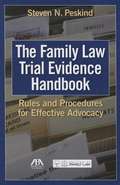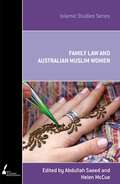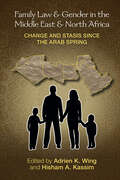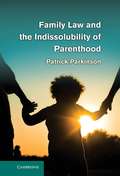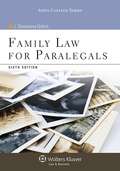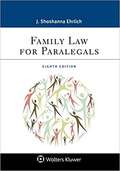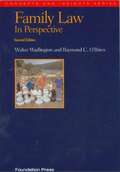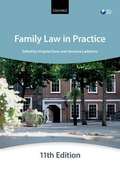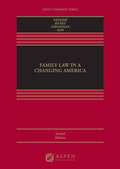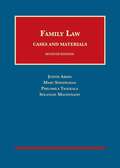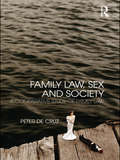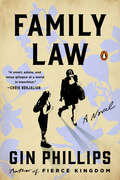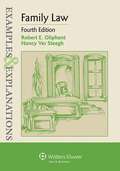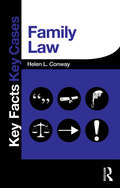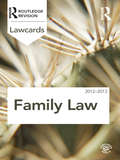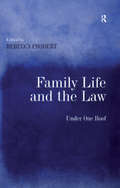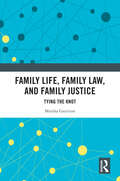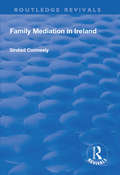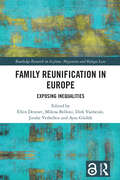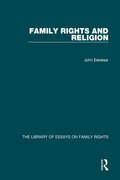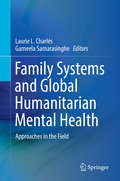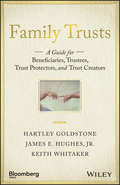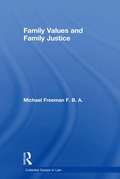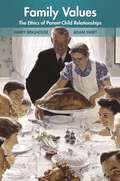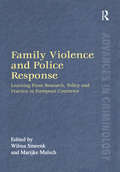- Table View
- List View
Family Law Trial Evidence Handbook: Rules and Procedures For Effective Advocacy
by American Bar Association Steven N. Peskind Section Of Family Law StaffBeing a trial lawyer requires a working knowledge of the rules of evidence. Based upon the author's years of family law practice, this practical handbook is useful for all family law trial lawyers, regardless of whether they practice in a state that uses a variation on the Federal Rules or a common law body of rules on evidence. Topics range from hearsay, authentication of writings, and examination of witnesses to tendering exhibits, procedures for streamlining admission of evidence, and requests to admit facts and genuineness of documents.
Family Law and Australian Muslim Women (Islamic Studies Series)
by Dr Helen McCue Professor Abdullah SaeedThis book is a collection of essays that aims to identify the multitude of ways in which Australian Muslim women negotiate both Australian Family Law and Islamic Family Law in the key areas of marriage, divorce, child custody, property settlement and inheritance. The book also seeks to provide a timely and significant insight into the carious legal, cultural and social processes that Australian Muslim women use when disputes in these key areas arise. Islamic Studies Series - Volume 15
Family Law and Gender in the Middle East and North Africa: Change and Stasis since the Arab Spring
by Adrien K. Wing Hisham A. KassimThe volume serves as reference point for anyone interested in the Middle East and North Africa as well as for those interested in women's rights and family law, generally or in the MENA region. It is the only book covering personal status codes of nearly a dozen countries. It covers Muslim family law in the following Middle East/north African countries: Tunisia, Egypt, Morocco, Algeria, Iraq, Lebanon, Jordan, Israel, Palestine, and Qatar. Some of these countries were heavily affected by the Arab Spring, and some were not. With authors from around the world, each chapter of the book provides a history of personal status law both before and after the revolutionary period. Tunisia emerges as the country that made the most significant progress politically and with respect to women's rights. A decade on from the Arab Spring, across the region there is more evidence of stasis than change.
Family Law and the Indissolubility of Parenthood
by Patrick ParkinsonThere are few areas of public policy in the Western world where there is as much turbulence as in family law. Often the disputes are seen in terms of an endless war between the genders. Reviewing developments over the last 30 years in North America, Europe and Australasia, Patrick Parkinson argues that, rather than just being about gender, the conflicts in family law derive from the breakdown of the model on which divorce reform was predicated in the late 1960s and early 1970s. Experience has shown that although marriage may be freely dissoluble, parenthood is not. Dealing with the most difficult issues in family law, this book charts a path for law reform that recognizes that the family endures despite the separation of parents, while allowing room for people to make a fresh start and prioritizing the safety of all concerned when making decisions about parenting after separation.
Family Law for Paralegals
by J. Shoshanna EhrlichThoughtful and carefully-written, Family Law for Paralegals presents the nuts-and-bolts in a relevant historical framework with exposure to some of the most dynamic issues in family law today. The comprehensive coverage balances the basic issues of marriage and divorce with cutting-edge concerns such as non-marital families, child abuse and neglect, and same-sex marriage. Helpful real-life examples and sample forms show students what they will encounter in practice. Useful pedagogy helps students develop their critical thinking and writing skills, and a range of assignments in each chapter provides practice in research, analysis, memo-writing, and argumentation. Fresh new cases enliven the Sixth Edition. New material features changes in the law relating to same-sex marriage as well as technological innovations such as e-filings for divorce. A new discussion of divorce and military families is presented, and issues related to international families are explored. The Sixth Edition covers all the new rulings on the Defense of Marriage Act (DOMA. ) Features: nuts-and-bolts of family law in relevant historical framework with exposure to dynamic, contemporary issues comprehensive coverage fundamental issues of marriage and divorce cutting-edge concerns: non-marital families, child abuse and neglect, and same-sex marriage real-life examples and sample forms preview actual practice useful pedagogy helps students develop critical thinking and writing skills summaries key terms review and discussion questions range of assignments for practice in research, analysis, memo writing, and argumentation Thoroughly updated, the revised Sixth Edition presents: fresh new cases current changes in the laws relating to same-sex marriage new coverage of technological innovations, such as e-filings for divorce discussion of divorce and military families legal issues related to international families new rulings on the Defense of Marriage Act (DOMA)
Family Law for Paralegals (Aspen Paralegal)
by J. Shoshanna EhrlichThe Eighth Edition of Family Law for Paralegals continues to provide complete coverage of traditional family law topics with historical context and dynamic cutting-edge issues such as non-marital families, child abuse and neglect, and same-sex marriage. <p><p> J. Shoshanna Ehrlich s balanced approach prepares students to handle the work of a paralegal through examples, assignments, and sample forms that mirror legal practice.
Family Law in Perspective (Second Edition)
by Walter WadlingtonThis readable and authoritative text is designed for law students as a supplement in a basic family law course. The manageably-sized text approaches family law conceptually with coverage extending over a broad area. The Second Edition reviews the multiple state decisions and statutes occurring since the first edition, and integrates them with what has previously been the law. So too, the new edition analyzes the recent enactments of Congress and decisions by the federal judiciary that affect family law. The result of this integration of federal and state approaches is an up-to-date perspective on such issues as private ordering among adults, same sex marriage, relationships mirroring the benefits of marriage, abortion, child support and custody, relocation, domestic violence, and an increasing awareness of the international ramifications of support and custody orders. Procreation and the biological revolution have radically altered the establishment of paternity and maternity and increased scrutiny of the new reproductive technologies available. And regrettably, states and Congress continue to struggle with child abuse and neglect, termination of parental rights, and children residing in foster care or kinship care. Many of these topics are highlighted with a brief footnote so as to offer the reader a portal into further research into that particular subject. The new edition offers an explanation of what has occurred in the past and a rational suggestion as to the trends of the future.
Family Law in Practice
by The Editors at the The City Law School City University LondonAdopting a highly pragmatic approach, Family Law in Practice encourages students to build on their existing basic practitioner skills, and highlights how to approach writing opinions and drafting documents specific to family law. It provides invaluable practical advice on how to prepare for different types of hearing, what factors to consider in relation to negotiation, how to make persuasive submissions, and how to handle witnesses effectively, ensuring that the junior practitioner is fully prepared for his or her first steps in the family courts. Key updates to this new edition include coverage of the Children and Families Act 2014, the Crime and Courts Act 2013, and the Child Maintenance Service. Case law has been revised throughout and the major changes affecting civil partnership, same-sex marriage, and the Single Family Court are fully covered.
Family Law in a Changing America (Aspen Casebook Series)
by Joanna L. Grossman Douglas NeJaime R. Richard Banks Suzanne A. KimFamily Law in a Changing America highlights law and family patterns as they are now, not as they were decades ago. By focusing on key changes in family life, the casebook attends to rising equality and inequality within and among families. The law, formally at least, accords more equality and autonomy than ever before; yet, as our society has grown more economically unequal, so too have family patterns diverged, with marriage and marital child-rearing becoming a mark of privilege. A number of developments--mass incarceration, the privatization of care, and reproductive technologies--have also contributed to disparities based on race, class, and gender. The casebook reflects the law's continuing emphasis on marriage, but also treats nonmarital families as central. Rather than privilege the marital heterosexual family, the casebook organizes the presentation of the law around (1) adult relationships and (2) parent-child relationships.
Family Law, Cases And Materials (University Casebook Ser.)
by Judith Areen Marc Spindelman Philomila Tsoukala Solangel MaldonadoThe Seventh Edition of Cases and Materials on Family Law offers students a comprehensive and engaging introduction to family law with a distinctive focus on how large-scale social inequalities structure, and are structured by, family law. The Seventh Edition spotlights issues of race, ethnicity, gender, sexuality, trans, and class inequalities―often at their intersections―across the entirety of the book in ways that mark the book as squarely in the present, but informed by a sense of history to help students imagine the future of family law. The Seventh Edition features a revamped introductory chapter with voices from across the political spectrum designed to get students excited about the course from day one, along with new materials on children, especially child custody and welfare, and comprehensive engagement with assisted reproduction. For student experience, the Seventh Edition includes a range of experiential tools, including problems on the financial aspects of divorce and support and a comprehensive divorce negotiation exercise, that give students a taste for practice in the field.
Family Law, Sex and Society: A Comparative Study of Family Law
by Peter De CruzComparative in both approach and framework, Family Law, Sex and Society provides a critical exposition of key areas in family law, exploring their evolution and development within their historical, cultural, political and legal context.Cross-referencing to English law throughout, this comparative textbook pays particular attention to the transformation of marriage; the development of divorce laws; matrimonial property; the legal recognition of unmarried heterosexual and same-sex cohabitants; the universal adoption of the best interests standard for children in domestic and international legislation; and the impact of the Human Rights Act 1998 on family law in a variety of jurisdictions.Divided into different sections, Family Law, Sex and Society includes coverage of: a jurisdictional and historical survey of some of the main themes in Family Law, as well as consideration of the evolution of the Western family the English law relating to divorce, marital property and children and a comparison with the equivalent law in the civil law jurisdictions of France and Germany family law developments in other common law countries such as Australia and New Zealand, selected American jurisdictions, parts of Africa and some Far Eastern countries; and hybrid jurisdictions like Japan and Russia an analysis of the law relating to unmarried cohabitation and domestic partnerships in civil law jurisdictions such as France, Germany and Sweden in comparison to Anglo-American law a comparative analysis of the laws relating to domestic violence. Family Law, Sex and Society offers valuable socio-legal and socio-cultural insights into the practice of family law, and is the only textbook that provides a unified, coherent and comparative approach to the study of family law as it operates in these particular jurisdictions.
Family Law: A Novel
by Gin PhillipsWhen an ambitious female lawyer becomes the victim of harassment, she must decide what's more important: her family's safety or the rights she's fighting for?Set in Alabama in the early '80s, Family Law follows a young lawyer, Lucia, who is making a name for herself at a time when a woman in a courtroom is still a rarity. She's received plenty of threats for her work extricating women and children from troubled relationships, but her own happy marriage has always felt far removed from her work. When her mother's pending divorce brings teenaged Rachel into Lucia's orbit, Rachel finds herself captivated not only with Lucia, but with the change Lucia represents. Rachel is out-spoken and curious, and she chafes at the rules her mother lays down as the bounds of acceptable feminine behavior. In Lucia, Rachel sees the potential for a new path into womanhood. But their unconventional friendship takes them both to a crossroads. When a moment of violence--a threat made good--puts Rachel in danger, Lucia has to decide how much her work means to her and what she's willing to sacrifice to keep moving forward.Written in alternating voices from Lucia and Rachel's perspectives, Family Law is a fresh take on what the push for women's rights looks like to the ordinary women and girls who long for a world redefined. Addressing mother daughter relationships and what roles we can play in the lives of women who aren't our family, the novel examines how we shape each other and how we make a difference. The funny, strong, and yet tender-hearted female leads of Family Law illuminate a new kind of timeless Southern fiction--atmospheric, rich, and with quietly surprising twists and nuances all its own.
Family Law: Examples And Explanations
by Robert E. Oliphant Nancy Ver SteeghEmploying the trusted Examples & Explanations format, Examples & Explanations: Family Law, Fourth Edition, offers a cutting-edge study aid that will be an asset to any family law class.
Family Law: Family Law (Key Facts Key Cases)
by Helen ConwayKey Facts and Key Cases: Family Law will ensure you grasp the main concepts of your Family Law module with ease. This book explains in concise and straightforward terms: • The law relating to marriage and its breakdown• Recent developments in money cases• All recent cases relating to private and public child law Helen L. Conway is a former practising barrister, now District Judge. She is an experienced law author and has taught law in both the academic and commercial sectors. Key Facts and Key Cases is the essential series for anyone studying law at LLB, postgraduate and conversion courses and professional courses such as ILEX. The series provides the simplest and most effective way to absorb and retain all of the material essential for passing your exams. Each chapter includes: • diagrams at the start of chapters to summarise key points• structured headings and numbered points to allow for clear recall of the essential points• charts and tables to break down more complex information Chapters also contain a Key Cases section which provides the simplest and most effective way to absorb essential cases needed for exam success, using a simple and memorable visual checklist: • Essential and leading cases are explained• The style, layout and explanations are user friendly • Cases are broken down into key components by use of a clear system of symbols for quick and easy visual recognition Series editors: Jacqueline Martin LLM, has ten years’ experience as a practicing barrister and has taught law at all levels and Chris Turner LLM, who is a Senior Lecturer in law at Wolverhampton University.
Family Lawcards 2012-2013 (Lawcards)
by RoutledgeRoutledge Lawcards are your complete, pocket-sized guides to key examinable areas of the undergraduate law curriculum and the CPE/GDL. Their concise text, user-friendly layout and compact format make them an ideal revision aid. Helping you to identify, understand and commit to memory the salient points of each area of the law, shouldn’t you make Routledge Lawcards your essential revision companions? Fully updated and revised with all the most important recent legal developments, Routledge Lawcards are packed with features: Revision checklists help you to consolidate the key issues within each topic Colour coded highlighting really makes cases and legislation stand out Full tables of cases and legislation make for easy reference Boxed case notes pick out the cases that are most likely to come up in exams Diagrams and flowcharts clarify and condense complex and important topics '...an excellent starting point for any enthusiastic reviser. The books are concise and get right down to the nitty-gritty of each topic.' - Lex Magazine Routledge Lawcards are supported by a Companion Website offering: Flashcard glossaries allowing you to test your understanding of key terms and definitions Multiple Choice Questions to test and consolidate your revision of each chapter Advice and tips to help you better plan your revision and prepare for your exams Titles in the Series: Commercial Law; Company Law; Constitutional Law; Contract Law; Criminal Law; Employment Law; English Legal System; European Union Law; Evidence; Equity and Trusts; Family Law; Human Rights; Intellectual Property Law; Jurisprudence; Land Law; Tort Law
Family Life and the Law: Under One Roof
by Rebecca ProbertThis book brings a modern critical approach to bear on the broad range of subjects that used to constitute 'family law.' A key consideration in this collection is the way in which law itself is premised upon, constructing a particular image of the family. By bringing different areas of law together, Probert et al suggest it is possible to explore how differing ideas about 'the family' inform different areas of law. This approach allows Family Life and the Law to analyze the extent to which the law is consistent and/or inconsistent in its concept and treatment of the family across and within disciplines. The book is particularly timely in view of the passage of the Civil Partnership Act 2004, the implications of which reverberate throughout family law and allied disciplines, and the current reconsideration of the position of cohabiting couples.
Family Life, Family Law, and Family Justice: Tying the Knot
by Marsha GarrisonFamily Life, Family Law, and Family Justice: Tying the Knot combines history, social science, and legal analysis to chart the evolution and interdependence of family life and family law, portray current trends in family life, explain the pressing policy challenges these trends have produced, and analyze the changes in family law that are essential to meeting these challenges. The challenges are large and pressing. Across the industrialized West, nonmarital birth, relational stress, multi-partner fertility, and relationship dissolution have increased, producing a dramatic rise in single parenthood, poverty, and childhood risk. This concentration of familial and economic risk accelerates socioeconomic inequality and retards intergenerational mobility. Although the divide is most pronounced in the United States, the same patterns now affect families throughout the Western world. Across the European Union, there are 9.2 million "lone" parents, and just under half of their families live in poverty. Tying the Knot demonstrates how today’s family patterns are deeply rooted in long-standing, class-based differences in family life and explains why these class-based differences have accelerated. It explains how the values that guide family law development inevitably reflect the world in which families live and develops a new family law capable of meeting the needs of twenty-first century families. The book will be of considerable interest to family specialists from a number of fields, including law, demography, economics, history, political science, public health, social policy, and sociology.
Family Mediation in Ireland
by Sinéad ConneelyThis title was first published in 2002: After outlining the origins and development of family mediation on a world-wide basis, this book assesses family mediation services in the Republic of Ireland and Northern Ireland, within the context of the empirical and theoretical debates surrounding the practice. It is the first comprehensive study of the area in Ireland, appearing at an opportune time, due to the expansion of the service in the Republic and its virtual collapse in Northern Ireland. It argues that the service provided in the Republic of Ireland is appreciated by clients and is successful, although the issue of domestic violence remains. In contrast, it suggests that the absence of service provision in Northern Ireland is problematic, since it undermines consumer choice.
Family Reunification in Europe: Exposing Inequalities (Routledge Research in Asylum, Migration and Refugee Law)
by Ellen Desmet Milena Belloni Dirk Vanheule Jinske Verhellen Ayse GüdükThis book provides a multi-disciplinary investigation of family reunification laws, policies and practices across the European Union.Family reunification – the possibility for family members to (re)unite in a country where one of them is residing – has been high on the political agenda. Building on original empirical research with families and practitioners as well as in-depth doctrinal analyses, the book explores the fragmentation of legal rules, the gaps between formal regulations and practices, and their consequences for families across borders. Different contributions in the volume point to the growing inequalities among and within applicant families, based on residence status, gender, location, citizenship and socio-economic resources, due to the family reunification regimes currently in place.The book enhances interdisciplinary dialogue by providing clear insights into the specific contribution of migration law, private international law and social scientific analyses to the study of family reunification.The book is aimed at researchers working on the topic of family reunification, as well as students of law and socio-legal studies and practitioners in the field of migration.
Family Rights and Religion (The\library Of Essays On Family Rights Ser.)
by John EekelaarThe interaction between individual rights, which are often seen in secular terms, and religion is becoming an important and complex topic not only for academic study but for practical policy. This volume collects a range of writings from journals, edited collections and individual books which deal with different aspects of the interaction within the context of family life, and which appear with their original pagination. These studies have been selected because they throw a sharp light on central elements of the role of religion in determining the structure of the rights of family members in relation to one another, both from an historical and contemporary perspective. While many of the writings are focused on US and European systems, selected writings covering other systems illustrate the universal nature of the topic. The studies are accompanied by a reflective commentary from the editor which sets the writings in a broad context of social, constitutional and philosophical thought, with the aim of stimulating critical thought and discussion.
Family Systems and Global Humanitarian Mental Health: Approaches in the Field
by Laurie L. Charlés Gameela SamarasingheThis powerful reference explores the processes and practices of family systems therapy as conducted in humanitarian situations across the globe. It follows the editors’ previous volume Family Therapy in Global Humanitarian Contexts: Voices and Issues from the Field in defining systemic therapy as multidisciplinary, portable, and universal, regardless of how far from traditional clinical settings it is applied. Chapters from diverse locales document remarkable examples of courage and resilience on the part of therapists as well as clients in the face of war, unjust policies, extreme inequities, and natural disasters. Contributors describe choosing and implementing interventions to fit both complex immediate challenges and their local contexts as they work to provide systemic family and public mental health services, including:Assisting families of missing persons in CyprusEmergency counseling after a Florida school shooting Therapeutic metaphors in a Lebanese refugee campSessions with separated family members on the U.S./Mexico borderAddressing healthcare disparities in the CaribbeanTraining family therapists in Sri LankaFamily and community support during the Ebola epidemic in GuineaProviding systemically oriented therapy and supervision in high-conflict countriesRisk assessment using emerging media in Chilean communitiesFamily Systems and Global Humanitarian Mental Health: Approaches in the Field is a valuable resource for professionals in both the global North and South, including family therapists, psychologists, psychiatrists, nurses and public health professionals, and mental health and psychosocial support providers working in humanitarian settings.
Family Trusts
by James E. Hughes Jr. Keith Whitaker Hartley GoldstoneThis book follows the life-cycle of the trust. It provides very practical, hands-on "how-to-do-it" steps from creating the culture of the trust, conducting the first beneficiary meeting, to working with addictions. Topics include: Creating the Culture of the Trust Writing a Preamble to the Trust Selecting a Trustee Preparing Yourself to Meet with a Beneficiary Keys to Becoming an Excellent Beneficiary The Office of the Beneficiary
Family Values and Family Justice (Collected Essays in Law)
by Michael FreemanThis volume collects together Michael Freeman's work on the family and society, and the part law plays in defining, structuring and controlling it. He questions the role of family law and its interface with family values, as well as the rights and best interests of children. Responsible parenthood is examined as well as the relationship between family law and medical law, examining surrogacy and saviour siblings. On adult relations the volume centres on domestic violence, same sex marriage, and alternative dispute resolution. Finally he examines the relationship between law and religion, focusing on Jewish divorce and the role of the state. The book is essential reading for scholars and students of family law, as well as those interested in gender and patriarchy, law and feminism, rights, and dispute resolution.
Family Values: The Ethics of Parent-Child Relationships
by Adam Swift Harry BrighouseThe family is hotly contested ideological terrain. Some defend the traditional two-parent heterosexual family while others welcome its demise. Opinions vary about how much control parents should have over their children's upbringing. Family Values provides a major new theoretical account of the morality and politics of the family, telling us why the family is valuable, who has the right to parent, and what rights parents should—and should not—have over their children.Harry Brighouse and Adam Swift argue that parent-child relationships produce the "familial relationship goods" that people need to flourish. Children's healthy development depends on intimate relationships with authoritative adults, while the distinctive joys and challenges of parenting are part of a fulfilling life for adults. Yet the relationships that make these goods possible have little to do with biology, and do not require the extensive rights that parents currently enjoy. Challenging some of our most commonly held beliefs about the family, Brighouse and Swift explain why a child's interest in autonomy severely limits parents' right to shape their children's values, and why parents have no fundamental right to confer wealth or advantage on their children.Family Values reaffirms the vital importance of the family as a social institution while challenging its role in the reproduction of social inequality and carefully balancing the interests of parents and children.
Family Violence and Police Response: Learning From Research, Policy and Practice in European Countries (New Advances in Crime and Social Harm)
by Marijke Malsch Wilma SmeenkPolice response to incidents of intimate partner violence can be critical. This volume investigates the elements in the institutional, legal and organizational context that are relevant for police response to incidents in the realm of the private sphere and whether there exists a relation with the reporting of such incidents by victims. Addressing this complex question requires insights from research, policy and practice and, as such, any conclusions will have implications for each of these fields. This volume addresses issues that are key elements in the relationship between the (legal) response to family violence and the reporting by victims. These issues concern societal and legal definitions of family violence employed in research, policy making and legal practice; how the legislation of various countries covers violence in the private sphere; the way the police deal with reported incidents of intimate partner violence; and the role that other interventions play in the response to and combat of family violence and intimate partner violence.
